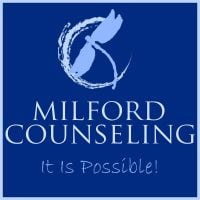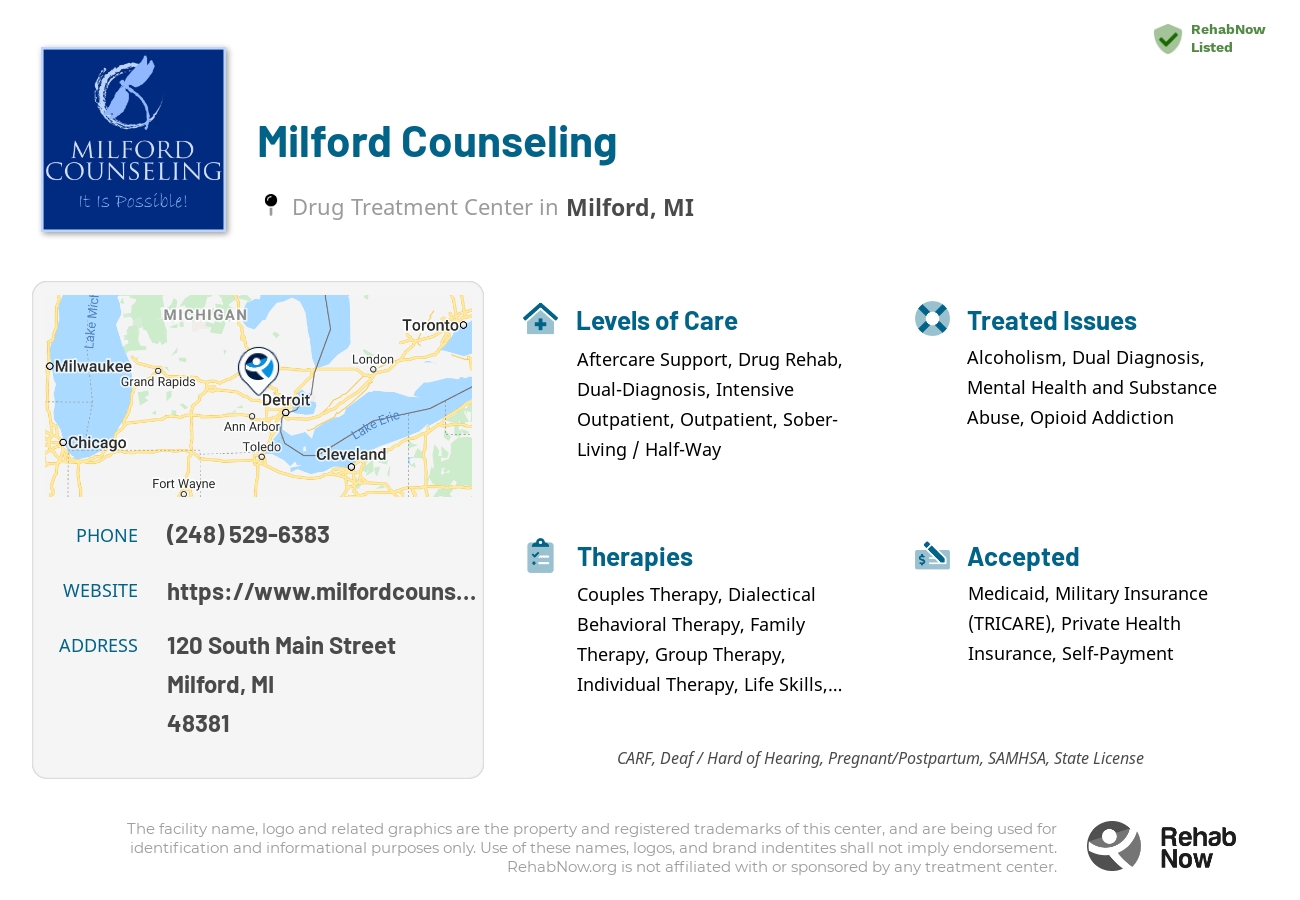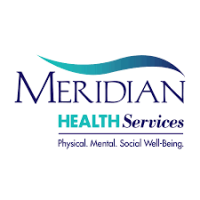Milford Counseling
Drug Rehab Center in Milford, Michigan
Milford Counseling is an addiction treatment and recovery center in Milford, Michigan, providing comprehensive and individualized care for substance abuse and mental health issues, including group and individual counseling, medication-assisted treatment, evidence-based treatment methods, holistic approaches, and supportive services.
About Milford Counseling in Michigan
Milford Counseling in Milford, Michigan is an addiction treatment and recovery center dedicated to providing comprehensive and individualized care to those seeking help from substance abuse and other related mental health issues. Their comprehensive services include group and individual counseling for both adults and adolescents, as well as medication-assisted treatment for addiction. Milford Counseling is also a Certified Addictions Counselor (CAC) for the State of Michigan, and is recognized as a leading provider of evidence-based treatment for co-occurring disorders in adults.
At Milford Counseling, their goal is to provide individualized treatment plans tailored to the needs of each patient that can best address their unique challenges and goals. Their evidence-based treatment methods range from cognitive-behavioral therapy and motivational interviewing, to relapse prevention and other forms of cognitive-behavioral therapy. They also provide a variety of supportive services such as case management, educational and workplace support, financial management, and community support. In addition to these traditional therapies, Milford Counseling also offers holistic approaches such as yoga and meditation, which have been shown to be effective at reducing cravings and improving overall mental health and wellbeing.
Milford Counseling is fully accredited by The Joint Commission, is licensed by the State of Michigan, and is a part of the Michigan Association of Alcohol and Drug Abuse Services (MAADAS). They have also been awarded an Excellence in Counselor Treatment award from the Certified Addictions Counselors Association, a national organization dedicated to recognizing excellence in addiction treatment and recovery. They are also a member of the National Addiction Treatment Providers Network, an association of addiction treatment centers, and the Substance Abuse and Mental Health Services Administration. By offering such a wide range of therapies and services, Milford Counseling is able to provide their patients with an array of treatment options for addiction and recovery.
Genders
Ages
Modality
Additional
Accreditations
State License
SAMHSA

CARF
The Commission on Accreditation of Rehabilitation Facilities (CARF) is a non-profit organization that specifically accredits rehab organizations. Founded in 1966, CARF's, mission is to help service providers like rehab facilities maintain high standards of care.
Conditions and Issues Treated
Opioid addiction is a common form of addiction, often caused by prescription drugs that are abused. Addiction is treated by detoxifying the body and following up with therapies to correct behavior and target the root of the problem.
Most opioid addiction begins with patients being prescribed painkillers after an injury or surgery. The body becomes used to the chemicals in these medications and soon no longer responds to their presence. As a result, addicts seek out stronger opiate-based medications like Oxycodone to compensate for the lack of effectiveness.
The most dangerous aspect is that these addictive behaviors often get carried over onto illicit drugs like heroin, which are increasingly potent and result in lower life expectancies.
Dual Diagnosis treatment centers like Milford Counseling provide this treatment tailored to the patient’s specific needs, and they also have a specialized focus on addiction treatment. Drug and alcohol addiction often coexists with another mental illness, such as depression or schizophrenia. In other words, drug addiction is only a symptom of a deeper problem.
When addiction enters into the picture, it can often lead to dangerous consequences in the addict’s life. For example, when addiction is paired with major depression, it can lead to suicidal thoughts or actions. When someone is addicted to drugs or alcohol, they often experience a failure to control their impulses and difficulty decision-making.
Dual diagnosis for drug addicts can be very effective when treating drug addiction in Milford, MI.
Levels of Care Offered
This center offers a variety of custom treatment tailored to individual recovery. Currently available are Aftercare Support, Drug Rehab, Dual-Diagnosis, Intensive Outpatient, Outpatient, Residential, Sober-Living / Half-Way, with additional therapies available as listed below.
Intensive Outpatient Programs (IOPs) are a form of drug treatment that allows individuals to receive the therapy they need while remaining in their homes and community. IOPs allow for the flexibility to continue working and living at home while still meeting treatment demands.
Outpatient treatment programs are less intensive than an inpatient program. Participants live at home while working or going to school. Benefits include being able to continue relationships with family, friends, and work/studies. Treatment includes educating patient on addiction to drugs, medication, and counseling. Benefits include being able to continue relationships with family, friends, and work/studies. Treatment includes educating patient on addiction to drugs, medication, and counseling. Counseling sessions are for either individual or group.
People who have completed treatment have the opportunity to go to a sober living home. These facilities located in Michigan, offered by Milford Counseling, support a sober living lifestyle. There are often curfews, chores, and therapy sessions enforced to keep residents clean. Career training and other resources are also provided to help recovering addicts return to the outside world. Sober living houses help the patient to smoothly transition from a formal treatment program to a normal life.
SLH (Sober Living Homes) is one of the options of aftercare that helps the patient maintain sobriety by preventing relapses. SLH provides the advantage of residing with a peer group who had similar experiences and share the common goal of staying sober. All the residents need to follow a set of rules or guidelines. These are different for different SLH. They help the patient gradually restore the life skills, interpersonal skills, and various other skills needed to be independent.
Residential treatment programs are those that offer housing and meals in addition to substance abuse treatment. Rehab facilities that offer residential treatment allow patients to focus solely on recovery, in an environment totally separate from their lives. Some rehab centers specialize in short-term residential treatment (a few days to a week or two), while others solely provide treatment on a long-term basis (several weeks to months). Some offer both, and tailor treatment to the patient’s individual requirements.
Aftercare Support in drug rehab is crucial because it helps people stay sober after treatment. The benefits of Aftercare Support are that it provides a pathway that will help people get sober for life. It supports healing at all levels, physical, mental, emotional, and spiritual.
Therapies & Programs
Individualized Treatment is essential because it gives addicts the ability to participate in a program that meets their unique needs. An addict should work with professionals who understand what they’re going through, especially if the addict is actively using.
Trying to find a treatment program that meets your needs can be challenging. It’s even more complicated if you don’t know what kind of treatment you need. Being able to have professionals who are experienced with treating your situation is key to getting sober. Finding the right treatment program for an addict is difficult, but it’s even harder without communicating with those who have experience treating your specific situation.
Couples therapy is beneficial for couples in which at least one partner has a substance use disorder. This type of therapy can help partners improve communication skills, which is an important factor in a healthy relationship. It can also help partners better understand one another so they have a greater understanding of how the other partner may be feeling.
Benefits of couples therapy include:
- Improvement in communication skills
- Increased understanding of the dynamics within a relationship
- Increased sense of support and trust in the relationship
- Better teamwork between partners/increased willingness to listen and work together
- Enhanced tolerance of each other’s shortcomings
- Improved ability to have open, honest communication with each other
Family dysfunction can often be the underlying cause of substance abuse. To get sober, you need to find a different way to cope with the pain in your life. Family therapy can help you and your family deal with old issues that may trigger substance abuse. It will help everyone understand why each member of the family feels and acts the way they do. It can give everyone new tools to manage their emotions so that they don’t want to drink or do drugs.
A person looking for drug recovery should know that group therapy is an essential tool. Group therapy provides accountability and friendship to people with addiction. It is recommended as a lifetime treatment habit. Group therapy occurs in a group setting as opposed to a one-on-one setting. It benefits patients by providing a feeling of support and letting them know they are not alone. Patients at Milford Counseling also learn to build trust and understanding and gain perspective through discussions.
If you are looking for a drug addiction treatment program that also provides trauma therapy, then Milford Counseling in Milford, MI is a great option. The staff at this facility specialize in helping people process and understand the past traumas that have led them to addiction. This approach can help individuals move forward with their recovery and take a better hold of their sober future.
The benefits of trauma therapy at Milford Counseling in Milford, MI are as follows:
- People will become less likely to engage in self destructive behaviors.
- Their emotional and mental health will significantly improve.
- They will be more confident in their abilities to live an addiction-free life.
- People will be able to connect with other people on a deeper level.
- Their problems with intimacy and trust will improve.
Dialectical behavior therapy is a type of cognitive-behavioral therapy that focuses on eliminating specific negative thoughts that can potentially lead to an individual inflicting self-harm. It helps treat patients exhibiting uncontrollable emotions, intense mood swings, and borderline personality disorders.
The term “dialectic” means the integration of opposites. In the substance abuse context, dialectical behavior therapy refers to accepting the patient’s addiction and changing their thoughts and behavior. It improves life skills such as controlling intense emotions without reacting impulsively, resolving interpersonal conflicts effectively, and promoting awareness about self and others.
Cognitive behavioral therapy (CBT) is a type of psychotherapeutic treatment that is focused on changing negative ways of thinking that contribute to addictive behavior.
Cognitive behavioral therapy is beneficial for:
- People who are seeking to overcome addictive behavior
- Those who struggle with addictive behavior and mental illness
- People who have a genetic history of addiction in their family
- Those who don’t want to depend on medications
- Those who need a more practical treatment approach
Life skills training is beneficial for addicts in recovery because it helps them learn how to take care of themselves and improve their quality of life, which can promote feelings of purpose and motivation.
This type of treatment works by teaching individuals life-enhancing skills that support positive living, including:
- Healthy lifestyle habits
- Skills to effectively manage stress
- Effective communication skills to help them get their needs met without turning to drugs or alcohol
- Money management and budgeting skills so they can continue to take care of themselves after treatment ends.
Payment Options Accepted
For specific insurance or payment methods please contact us.
Is your insurance accepted?
Ask an expert, call (888) 674-0062
Additional Details
Specifics, location, and helpful extra information.
Milford, Michigan 48381 Phone Number(248) 529-6383 Meta DetailsUpdated November 25, 2023
Staff Verified
Milford Counseling Patient Reviews
There are no reviews yet. Be the first one to write one.
Milford, Michigan Addiction Information
Michigan has the second-highest rate of drug and alcohol abuse in the nation. Heroin is linked to more than 50% of the state's hepatitis C cases. Marijuana is the drug most often associated with crimes in Michigan, followed by methamphetamines. Opioids alone are responsible for almost 20% of all drug overdose deaths in Michigan.
6.6% of Milford, Michigan, residents reported using illicit drugs. Additionally, 2.7% of Milford residents reported abusing prescription drugs. In Milford, Michigan specifically, there were 24 drug overdose deaths in 2017 - a rate of 27.1 deaths per 100,000 people. To find the best drug treatment facility for your needs, it is important to speak with a professional who can assess your situation and make recommendations based on your specific needs.
Treatment in Nearby Cities
- Plainwell, MI (104.9 mi.)
- Bad Axe, MI (89.3 mi.)
- Holly, MI (14.3 mi.)
- Lapeer, MI (35.2 mi.)
- Ionia, MI (79.6 mi.)
Centers near Milford Counseling
The facility name, logo and brand are the property and registered trademarks of Milford Counseling, and are being used for identification and informational purposes only. Use of these names, logos and brands shall not imply endorsement. RehabNow.org is not affiliated with or sponsored by Milford Counseling.












